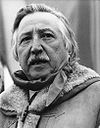
Luis Corvalán
Encyclopedia

Tomé
Tomé is a port city and commune in the Biobío Region of Chile. It is bordered by Coelemu to the north, Ránquil and Florida to the east, Penco to the south, and the Pacific Ocean to the west...
– July 21, 2010) was a Chile
Chile
Chile ,officially the Republic of Chile , is a country in South America occupying a long, narrow coastal strip between the Andes mountains to the east and the Pacific Ocean to the west. It borders Peru to the north, Bolivia to the northeast, Argentina to the east, and the Drake Passage in the far...
an politician. He served as the general secretary of the Communist Party of Chile
Communist Party of Chile
The Communist Party of Chile is a Chilean political party inspired by the thoughts of Karl Marx and Lenin. It was founded in 1922, as the continuation of the Socialist Workers Party, and in 1934 it established its youth wing, the Communist Youth of Chile .In the last legislative elections in Chile...
(PCCh).
Corvalán joined the Communist Party of Chile at the age of fifteen in the city of Chillán shortly after the fall of the repressive dictatorship of Carlos Ibáñez del Campo
Carlos Ibáñez del Campo
General Carlos Ibáñez del Campo was a Chilean Army officer and political figure. He served as dictator between 1927 and 1931 and as constitutional President from 1952 to 1958.- The coups of 1924 and 1925 :...
in 1932. Trained as a teacher, after 1952 he became an elected member of the PCCh's Central Committee, and after 1958 served as the Secretary-General. The party was outlawed from 1948 until 1958. In this period Corvalán was interned in the concentration camps of Pitrufquén
Pitrufquén
Pitrufquén is a Chilean city and commune in Cautín Province, Araucanía Region. The city is located 30 km south of Temuco and lies immediately south of the Toltén River, along Chile Highway 5.-History:...
and later in Pisagua
Pisagua
Pisagua is a Chilean port on the Pacific Ocean, located in Huara comuna , in Tarapacá Region, northern Chile. In 2007, the new province of El Tamarugal was established and the comuna of Huara, previously within the province of Iquique, was incorporated to the newly created province.-Early...
.
On September 11, 1973, General Augusto Pinochet
Augusto Pinochet
Augusto José Ramón Pinochet Ugarte, more commonly known as Augusto Pinochet , was a Chilean army general and dictator who assumed power in a coup d'état on 11 September 1973...
lead a military Coup
Chilean coup of 1973
The 1973 Chilean coup d'état was a watershed event of the Cold War and the history of Chile. Following an extended period of political unrest between the conservative-dominated Congress of Chile and the socialist-leaning President Salvador Allende, discontent culminated in the latter's downfall in...
and Corvalán was among the many arrested. After the murder of Victor Jara
Víctor Jara
Víctor Lidio Jara Martínez was a Chilean teacher, theatre director, poet, singer-songwriter, political activist and member of the Communist Party of Chile...
, he was the most prominent political prisoner
Political prisoner
According to the Longman Dictionary of Contemporary English, a political prisoner is ‘someone who is in prison because they have opposed or criticized the government of their own country’....
in Chile. While in prison, Luis Corvalán was awarded the Lenin Peace Prize
Lenin Peace Prize
The International Lenin Peace Prize was the Soviet Union's equivalent to the Nobel Peace Prize, named in honor of Vladimir Lenin. It was awarded by a panel appointed by the Soviet government, to notable individuals whom the panel indicated had "strengthened peace among peoples"...
(for 1973-74). The Soviet Union launched an international campaign for his release and on December 18, 1976 Corvalán was exchanged for a notable Soviet political prisoner, dissident
Dissident
A dissident, broadly defined, is a person who actively challenges an established doctrine, policy, or institution. When dissidents unite for a common cause they often effect a dissident movement....
Vladimir Bukovsky
Vladimir Bukovsky
Vladimir Konstantinovich Bukovsky is a leading member of the dissident movement of the 1960s and 1970s, writer, neurophysiologist, and political activist....
, and received asylum in the USSR.
Corvalán headed the Communist Party of Chile - both within Chile and whilst in exile - for over three decades, which covered the whole period of the Pinochet military dictatorship. Corvalán returned to Chile in 1988.

